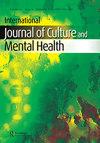Early trauma experiences, parenting styles, and personality patterns in individuals with depression from India
Q1 Social Sciences
International Journal of Culture and Mental Health
Pub Date : 2017-06-30
DOI:10.1080/17542863.2017.1342677
引用次数: 5
Abstract
ABSTRACT The study was carried out to understand the vulnerability factors for depression. The objectives were to, explore the early trauma experiences, parenting styles and personality patterns in depression and to examine relationship between the variables. The Sample composed of 30 individuals diagnosed with depression and 30 controls from the community in the age range of 18–45 years. The tools used were Socio demographic sheet, MINI-International Neuropsychiatric Interview Plus, Beck Depression Inventory- II, Early Trauma Inventory Self Report-Short Form, Parental Bonding Instrument, Sociotropy-Autonomy Scale, and General Health Questionnaire –12. Study group had significantly lower score on father care and higher overprotection from both parents along with higher scores on general punishment, emotional abuse, total trauma score and sociotropy compared to control group. Depression and early trauma experiences were positively correlated with mother’s overprotection and negatively correlated with mother care. Mother overprotection positively correlated with mother care. Father’s care negatively correlated with early trauma. Sociotropy, general punishment, and emotional abuse are significant predictors of depression. The study has implications in understanding the parenting, childhood adversity and personality in the cultural context while treating depression.印度抑郁症患者的早期创伤经历、父母教养方式和人格模式
摘要本研究旨在了解抑郁症的易感因素。研究的目的是探索抑郁症患者的早期创伤经历、父母教养方式和人格模式,并研究这些变量之间的关系。样本由30名被诊断为抑郁症的个体和30名来自社区的对照组组成,年龄在18-45岁之间。使用的工具有:社会人口统计表、mini -国际神经精神病学访谈加、贝克抑郁量表- II、早期创伤量表自我报告简表、父母关系量表、社会属性-自主性量表和一般健康问卷- 12。与对照组相比,研究组在父亲关怀得分较低,父母双方的过度保护得分较高,在一般惩罚、情感虐待、总创伤得分和社会属性得分较高。抑郁和早期创伤经历与母亲过度保护呈正相关,与母亲关爱负相关。母亲过度保护与母亲关爱正相关。父亲的照顾与早期创伤呈负相关。社会属性、一般惩罚和情感虐待是抑郁症的重要预测因素。本研究对理解文化背景下的父母教养、童年逆境和个性对抑郁症的治疗具有启示意义。
本文章由计算机程序翻译,如有差异,请以英文原文为准。
求助全文
约1分钟内获得全文
求助全文
来源期刊

International Journal of Culture and Mental Health
Social Sciences-Cultural Studies
CiteScore
2.10
自引率
0.00%
发文量
0
期刊介绍:
This title has ceased (2018). This important peer-review journal provides an innovative forum, both international and multidisciplinary, for addressing cross-cultural issues and mental health. Culture as it comes to bear on mental health is a rapidly expanding area of inquiry and research within psychiatry and psychology, and other related fields such as social work, with important implications for practice in the global context. The journal is an essential resource for health care professionals working in the field of cross-cultural mental health.Readership includes psychiatrists, psychologists, medical anthropologists, medical sociologists, psychiatric nurses and social workers, general practitioners and other mental health professionals interested in the area. The International Journal of Culture and Mental Health publishes original empirical research, review papers and theoretical articles in the fields of cross-cultural psychiatry and psychology. Contributions from the fields of medical anthropology and medical sociology are particularly welcome. A continuing dialogue between members of various disciplines in various fields is encouraged. The aim of the journal is to encourage its readers to think about various issues which have clouded cross-cultural development of ideas. The journal lays special emphasis on developing further links between medical anthropology, medical sociology, clinical psychiatry and psychology, and implications of the findings on service provisions. The journal is published four times a year. The style of reference is Harvard. All research articles in this journal, including those in special issues, special sections or supplements, have undergone rigorous peer review, based on initial editor screening and anonymized refereeing by at least two independent referees.
 求助内容:
求助内容: 应助结果提醒方式:
应助结果提醒方式:


